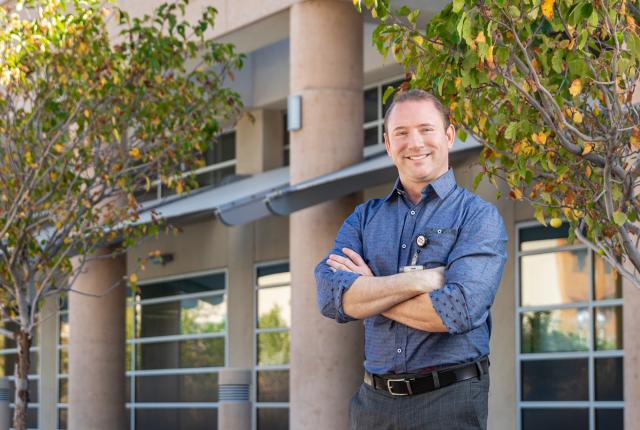Adam Crosby's grit and problem-solving skills have helped guide him through the crisis. Photograph by Gabriella Marks.
ADAM CROSBY WAS SHAKEN by the news. While on his way to work at University of New Mexico Hospital in early March, he heard reports that the Grand Princess cruise ship, with 3,500 on board, was being held off the California coast after 21 people tested positive for COVID-19.
“My nature is to want to help,” says the unit director for the hospital’s Dermatology Clinic. Crosby feared that the ill passengers, unnecessarily left out at sea, would infect others and fail to receive the critical treatment they needed. “I thought, We’re in trouble. It’s here.”
Crosby called an all-staff meeting the following morning to prepare employees for when UNM Hospital might start receiving COVID-19 cases. “There were a lot of very upset people; some were in tears,” he says. He assembled a team of volunteer nurses from UNM clinics, ranging from eye specialists to orthopedists, to lead the Respiratory Care Center, the only 24/7 COVID-19 testing site in the state.
Crosby got started in healthcare in his hometown of Baytown, Texas, where he became a certified nursing assistant in high school. But he had plans to attend acting school at KD Studio, in Dallas, on a scholarship, before a trip with a friend who was attending New Mexico Highlands University, in Las Vegas, changed his path.
“I fell in love with the state,” says Crosby. “I didn’t show up for my first day of classes in Dallas, moved to New Mexico, and I’ve been here ever since.”
Crosby served as a Rio Rancho police officer for 10 years while also working his way up the ranks to emergency room technician. Eventually, he became nursing supervisor of UNMH’s Level 1 trauma center before taking over as director of dermatology in 2018. “I use the skills from law enforcement every day in my job,” he says. “It is 100 percent about connecting with people and getting the job done.”
Crosby’s grit and problem-solving skills helped guide him through the crisis. A member of the employee screening committee, he helped to write and administer the protocols necessary to screen staff and patients entering the hospital premises. He was instrumental in creating the proper documentation for the hospital to bill insurance companies for COVID-19 testing.
He also spent early mornings and late evenings with volunteer nurses to refresh them on IV and phlebotomy skills to ensure that they felt confident and prepared to serve patients. “Most of the staff had not worked in this environment,” he says. “Emotions were high, people were afraid. We didn’t know if we were going to get COVID-19.”
Another pivotal role Crosby assumed during the crisis was communicating new COVID-19 developments. “You’re trying to go back to your team and deliver news in a way that doesn’t cause panic and keeps everyone calm and motivated,” he says.
The Respiratory Care Center tested an average of 150 people per day, with a maximum of 430 patients in one day. Crosby is especially proud that, even with that kind of volume, no employees contracted COVID-19 from the workplace.
“This feat took many hours—early, late, and weekends—both writing the protocols and procedures required in a hospital situation, but also the physical setup,” says Therese Holguin, medical director for UNMH’s Dermatology Clinic. “He did what he did because it was the right thing to do. That is who he is.”


